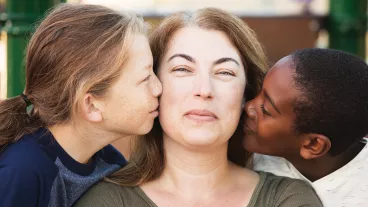Working Together to Care for Kids: Carers' wellbeing and family relationships
5 of 5
May 2018
Download Research snapshot
Overview
Although carers of out-of-home-care children reported deriving a strong sense of reward from their care experience, many also indicated significant challenges in their everyday care of the children. This Research Snapshot directs attention to carers' wellbeing and their family relationships.1
1 The information in this Research Snapshot is based on Working Together to Care for Kids: A Survey of Foster and Relative/Kinship Carers, which collected data from 2,203 foster and relative/kinship carers in 2016 via telephone interview. The survey was conducted by the Australian Institute of Family Studies (AIFS) in 2016, in collaboration with the Australian Government Department of Social Services (DSS), and funded by DSS. The sample was drawn from foster and relative/kinship carers who registered in the states/territories (except Northern Territory) as formal carers of out-of-home-care children aged 0-17 years old at 31 December 2015.
Key messages
-
Carers overall provided a positive assessment in terms of their health, life satisfaction and family relationships.
-
However, nearly one-quarter of carers had a disability or medical condition that was likely to last for six months or more and cause them difficulties in everyday life and one-fifth of those living with a partner reported that their partner had such a condition, with relative/kinship carers being more likely to report these.
-
Negative care experiences and lack of support were found to be associated with poorer wellbeing and family relationships for carers.
General health
Table 1 summarises carers' reports on various wellbeing measures. Regarding carers' health:
- The majority of carers rated their health as "excellent" or "very good". Only one in ten carers believed that their health was "fair" or "poor".
- Close to one-quarter of carers indicated that they had a disability or medical condition that was likely to last for six months or more and cause them difficulties in everyday life. In addition, one-fifth of carers living with a partner reported that their partner had a disability or medical condition.
- Table 1 also shows the mean scores of the vitality and mental health scales that are part of the SF-36 (the 36-Item Short-Form Survey), with a higher score on the vitality scale indicating higher levels of energy, and a higher score on the mental health scale suggesting feelings of peace and happiness.2
- The overall mean score for vitality was 64 on a scale of 0-100, indicating a good level of energy. For mental health, the overall mean was 80 on a scale of 0-100, suggesting carers tended to positively assess their mental health.3
Carers' reports on their health status differed somewhat by care type:
- Relative/kinship carers were less likely to rate their general health as being "excellent" or "very good" in comparison to foster carers, with, conversely, relative/kinship carers being more likely than foster carers to rate their health as being "fair" or "poor".
- Relative/kinship carers were more likely than foster carers to say that they had a disability or medical condition that was likely to last for six months or more, and if living with a partner, that their partner had such conditions.
- Relative/kinship carers appeared to fare less well in the vitality and mental health scales; nevertheless, the differences between the care types were small.
2 The vitality scale was derived from responses to four items (e.g., feeling tired and "worn out", having lots of energy in the previous four weeks, and the mental health scale was based on five items (e.g., feeling nervous, whether he/she is a happy person).
3 Respondents aged 15 years and over in HILDA 2014 had a mean score of 60 on the vitality scale and a mean score of 74 on the mental health scale.
Life satisfaction
Table 1 also depicts carers' ratings on their satisfaction with their life as a whole.
- Overall, the mean rating of life satisfaction was 8.3, indicating that carers were generally satisfied with their life overall, with three-quarters of carers reporting high levels of satisfaction (ratings of 8-10).
- Despite overall high levels of life satisfaction, relative/kinship carers were less satisfied with their life in comparison to foster carers.
| Foster carers | Relative/kinship carers | All | |
|---|---|---|---|
| General health (self-rated) | |||
| Excellent or very good | 67.0% | 53.4% | 59.9% |
| Good | 25.2% | 30.1% | 27.8% |
| Fair or poor | 7.8% | 16.5% | 12.3% |
| Total | 100.0% | 100.0% | 100.0% |
| Mean score of vitality (SF-36) | 64.8 | 62.9 | 63.8 |
| Mean score of mental health (SF-36) | 81.4 | 79.1 | 80.2 |
| Medical conditions/disabilities (respondent carer) | 17.9% | 28.2% | 23.3% |
| Partner had medical conditions/disabilities a | 16.2% | 26.2% | 21.1% |
| Overall life satisfaction (ratings from 0 = completely dissatisfied to 10 = completely satisfied) | |||
| High satisfaction (8-10) | 81.9% | 73.6% | 77.6% |
| Mean rating | 8.4 | 8.1 | 8.3 |
| Number of carers | 1,188~1,194 | 1,001~1,004 | 2,191~2,199 |
Note: a The question applied to carers who were living with a partner.
Family relationships
Carers' ratings on their satisfaction with various family relationships are shown in Table 2, including relationship with the study child, partner's relationship with the study child, how the study child got along with other children in the household, relationship with own partner, and relationship with own children in the household. The rating options ranged from 0 (completely dissatisfied) to 10 (completely satisfied).
- For all the five types of family relationships, carers provided very positive assessment, with mean ratings ranging from 8.1 (study children got along with other children in the household) to 9.1 (carer's relationship with partner and own children), with 69-89% reporting high satisfaction (ratings of 8-10).
- Despite an overall positive picture on family relationships, foster carers were less satisfied than relative/kinship carers on the following aspects:
- own relationship with the study child;
- partner's relationship with the study child; and
- how the study child got along with other children in the household.
| Foster carers | Relative/kinship carers | All | |
|---|---|---|---|
| Your relationship with study child | |||
| High satisfaction (8-10) | 83.4% | 89.8% | 86.8% |
| Mean rating | 8.79 | 9.12 | 8.96 |
| You partner's relationship with study child | |||
| High satisfaction (8-10) | 82.6% | 87.9% | 85.1% |
| Mean rating | 8.77 | 9.01 | 8.88 |
| How study child gets along with other children in the household | |||
| High satisfaction (8-10) | 66.3% | 71.8% | 69.0% |
| Mean rating | 7.95 | 8.26 | 8.1 |
| If living with a partner: Your relationship with partner | |||
| High satisfaction (8-10) | 92.0% | 89.7% | 90.9% |
| Mean | 9.15 | 9.11 | 9.13 |
| If have own children in the household: Your relationship with your children in the household | |||
| High satisfaction (8-10) | 91.9% | 90.9% | 91.4% |
| Mean rating | 9.12 | 9.11 | 9.12 |
| Number of carers | 396~1,196 | 270~1,001 | 667~2,189 |
Note: a For each item, ratings range from 0 = completely dissatisfied to 10 = completely satisfied.
Carers' wellbeing and family relationships and their carer experience
Negative care experiences and lack of support were found to be associated with poorer wellbeing and family relationships for carers.
- Study children's prior history of indicators of abuse/neglect appeared to be associated with lower levels of carer vitality, and lower satisfaction with carers' relationship with the study child and the relationship between the study child and other children in the household.
- Higher levels of care challenges were associated with poorer levels of vitality and mental health, lower satisfaction with life and lower satisfaction with various family relationships.
- The perceived inadequacy of the allowances and lack of support were also linked with a lower satisfaction with some family relationships. In addition, a sense of lack of support was linked with poorer wellbeing in some measures.
Featured image: istockphoto/StockPlanets
Qu, L., Lahausse, J., & Carson, R. (2018). Working Together to Care for Kids: A survey of foster and relative/kinship carers. (Research Report). Melbourne: Australian Institute of Family Studies.
Download Research snapshot
Related publications

Working Together to Care for Kids: Carer support and…
This Research Snapshot focuses on carers' reports on training they had received and the degree of contact with their…
Read more
Working Together to Care for Kids: Carer service use and…
This Research Snapshot focuses on carers' reports on their access to and views on service support.
Read more
Working Together to Care for Kids: Carers' views - Rewards…
This Research Snapshot explores the thoughts and feelings of carers of out-of-home-care children about their care…
Read more